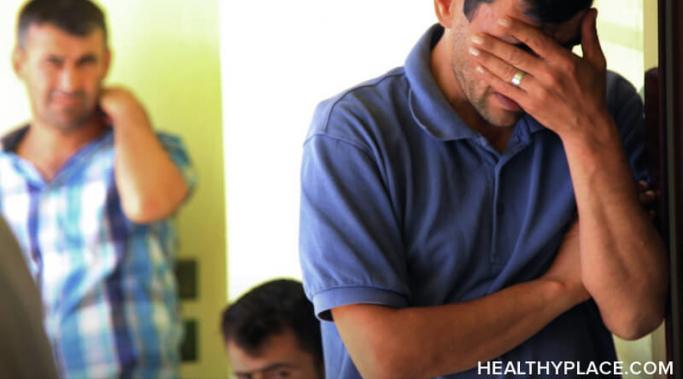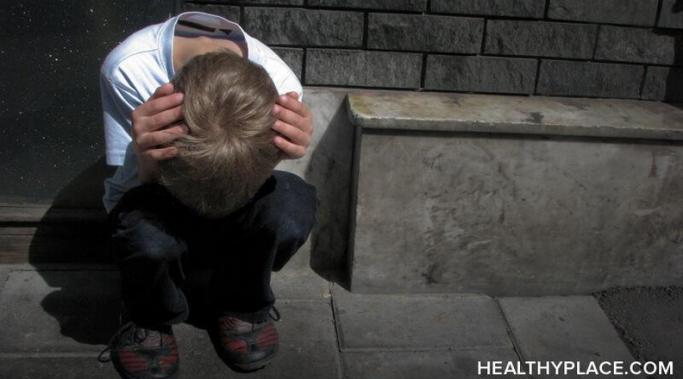Blogs
Amanda_HP
Suicide prevention. People talk about it, but is preventing someone from committing suicide really possible? That's a big question.
Suicide statistics reveal over 44,000 Americans committed suicide in 2016 and for every completed suicide, there were 25 attempted suicides.1 Unfortunately, the numbers are growing.
Amanda_HP
There's a lot of awareness around depression these days. People talk more freely about it, there are antidepressant ads on television and radio, and, of course, there's the Internet where information on depression is bountiful. So how is it that a person could be suffering from depression but not recognize the symptoms of depression in themselves?
The life you want will become reality if you leave your abusive relationship with an educated, clear mind. If you leave the relationship as a victim, you will find yourself victimized in your "new" life, too. You must find your strength before you walk out the door because friend, you will need every bit of your power (and some borrowed from those who love you) if you want to create a life of joy and happiness.
You don't look sick! No, I don't. It shouldn't be an accusation, either. One of the worst parts of having an anxiety disorder, or any other invisible illness, is how hard it is to explain to someone when they don't have the first notion. It becomes almost a routine battle, feeling sick on the inside while knowing the world thinks you look fine.
My name is Alistair McHarg and my mental health humor blog, “Funny In The Head”, is a weekly feature here at HealthyPlace. The goal is to help us all discover and rediscover the fundamental absurdities and humor in the challenges we face and overcome. I believe seeing the humor in our trials is a key ingredient of recovery and health.
Jess Weiner: " Did Loving My Body Almost Kill Me?"
That is the headline splashed across an article in September's Glamour magazine and online site. Weiner, a well-known author and speaker, has stressed for years that women of all weights and sizes can live happy and fulfilling lives right now. She lived her words, and created a successful career and life while being a size 18. That alone sounds radical in today's society that worships thinness and works hard to make women feel unsuccessful and unworthy if we dare to take up more space than a will-o'-wisp.
Then Weiner went to her physician, and that is all it took to take her down the familiar weight loss path of dieting and excessive exercise.
I went to see my own psychiatrist this week for my biannual "how's it going" visit. I said what I had to say. He pretended to listen and asked me questions I'd already answered. Then he said, "I don't think we need to change anything right now. I think you're just demoralized with everything you've got going on." Then he handed me the same prescription he's handed me for the past year.
I was relieved, in a way--even though I'm reasonably certain other things have come into play in my head, I've been concerned about changing up my medication, afraid he may introduce something new that would render me even more of a trainwreck than I've been lately. And at this stage of the game, I can't afford to be any less functional.
There is a popular misconception that depression is the same thing as sadness. I understand why you might think this if you don't have experience with depression. Depression is sad; it's true. But depression is a lot of other things as well. It's a whole new echelon of sadness. It's sadness 2.0.
This morning is a good example - I woke up depressed and the experience is nothing like sadness.
Yesterday, I had the pleasure of being interviewed by Armand DiMele, for his radio show on WBAI in NYC, which airs Tuesdays and Wednesdays at 1 PM.
We talked about many things, using my book Ben Behind His Voices: One Family's Journey from the Chaos of Schizophrenia to Hope as a launching pad for advice for families.
What Armand most wanted to cover was the need for early detection (when does "my child is a little bit off" become "this is a possible mental illness"?), the experience of other family members (siblings, spouses, children as well as parents of those with a mental illness), and the need for communication skills and self-care in dealing with our loved ones. He rightly saw our family story as a platform for introducing others in similar situations to the need for things like education (such as NAMI, and of course HealthyPlace.com), support, advocacy, respect and self-care.
I took off a week off blogging, and after a mini breakdown of anxiety and panic attacks, I wanted to discuss in detail the importance of self care, and healthy coping skills not only in early sobriety, but in life as well. I will be on vacation next week and feel really passionate about this topic so I did two vlogs to talk about struggles, healthy coping skills, self care, and how it is important to take care of ourselves before we can help anyone else. I hope you enjoy and look forward to coming back in two weeks refreshed from my vacation off all media, internet and lounging by the pool in palm springs! If you want a funny puppy story definitely watch the second video :)








